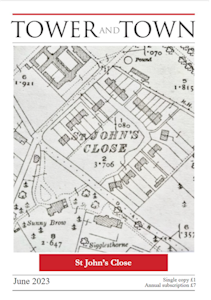

Tower and Town, June 2023 (view the full edition) (view the full edition)Nature's InspirationEngland's green and pleasant land is at its most bountiful and beautiful in the month of June, when our wild birds and animals are tending their young, butterflies are fluttering over downland rides, spotted orchids are in profusion and trees in full leaf. Composers have always sought inspiration from the natural world: some, like Beethoven and Benjamin Britten, found that regular walks in the Vienna Woods or along the shingle beach in Aldeburgh unlocked ideas, themes, sometimes whole musical passages, ready to be scribbled down later. Antonio Vivaldi, despite his urban existence in the heart of 18th C Venice, created a pastoral idyll in his celebrated set of Concertos "The Four Seasons", prefaced by a set of four charming sonnets. In between the orchestral refrains there are interludes illustrating phrases from the text, marked above the music with letters. In "Spring", three violins approximate the calls of Blackbird, Goldfinch and Nightingale, briefly interrupted by string pyrotechnics representing thunder and lightning. The violas imitate the sleeping shepherd's faithful dog barking at his feet, then nymphs and shepherds dance under a glorious spring sky. Haydn wrote his oratorio "The Creation" in his late 60s, a tribute to the natural world, highly inventive and sometimes humorous. There is a Representation of Chaos, both the Sun and the Moon have their moments and in one Bass aria there are musical tributes to a stag and a horse, cattle and sheep, insects and, "in long dimensions, with sinuous trace, the worm!" His pupil Beethoven produced a "Pastoral" Symphony in the slow movement of which a gentle cadenza, played twice, mimics the sounds of Nightingale (flute) Quail (oboe) and Cuckoo (clarinet) one by one. We are lucky to have good numbers of Skylarks locally, despite its drastic decline in many parts of the U.K. Its continuous liquid song, which I hear above Windmill Hill near Avebury, inspired Meredith's "The Lark Ascending" and Vaughan Williams's beautiful composition of that name. Written at the start of the Great War, its opening orchestral chords seem to evoke an aura of sadness and impending loss before the solo violin takes wing, its music circling, ascending and gradually disappearing into the heavens. At the heart of the piece the orchestra takes a more active, conversational role: the players are warmed and inspired by the soloist's rhapsodising and begin to join the melodic line as both volume and intensity increase. Such music has the power to express the inexpressible when we consider the beauty and magic of the natural world.  Robin Nelson |